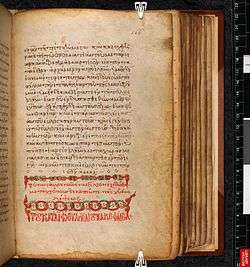Minuscule 446
Minuscule 446 (in the Gregory-Aland numbering), ε 507 (in the Soden numbering),[1] is a Greek minuscule manuscript of the New Testament, on parchment. Palaeographically it has been assigned to the 15th century. The text represents the Byzantine textual tradition. The manuscript was prepared for liturgical use.
| New Testament manuscript | |
 Folio 166 recto | |
| Name | Codex Harleianus 5777 |
|---|---|
| Text | Gospels † |
| Date | 15th century |
| Script | Greek |
| Now at | British Library |
| Cite | Wright, Fontes Harleiani |
| Size | 22.9 cm by 15 cm |
| Type | Byzantine text-type |
| Category | V |
| Note | marginalia |
Description
The codex contains almost complete text of the four Gospels on 228 parchment leaves (22.9 cm by 15 cm) with some lacunae (Matthew 1:1-17; 26:47-27:40; Mark 1:1-9; Luke 1:1-18; John 1:1-21). All lacunae were made by a man who mischievously cut out the ornamented headpieces at the beginning of each Gospel.[2] In modern time two unfoliated parchment leaves, and two paper fly-leaves were added at the beginning and end.[3]
The text is written in one column per page, in 25 lines per page.[4] The letters are clearly but unskilfully written.[2] The manuscript is decorated, with geometric, occasionally with zoomorphic decorations, in brown and red. The initial letters, titles, colophons, and rubrics in red.[3]
The text is divided according to the κεφαλαια (chapters), whose numbers are given at the margin, and their τιτλοι (titles) at the top of the pages. There is also a division according to the smaller Ammonian Sections (in Mark 232 sections, last in 16:6). It has no references to the Eusebian Canons.[5]
It contains tables of the κεφαλαια (tables of contents) before each Gospel, lectionary markings at the margin (for liturgical use), Synaxarion, Menologion, and subscriptions at the end of each Gospel.[2][5]
Text
The Greek text of the codex is a representative of the Byzantine text-type. Aland placed it in Category V.[6] According to the Claremont Profile Method it represents textual family Kx in Luke 1 (fragmentary), Luke 10, and Luke 20. It belongs also to the textual cluster 1213 (minuscule 1213 is the lead manuscript of this cluster).[7]
History
The original manuscript contained dated colophon, but it was erased by a later hand.[3] The manuscript is dated by the INTF to the 15th century.[4][8] The manuscript probably was rewritten from minuscule 65.[5]
The manuscript was brought by John Covel, British chaplain, from Constantinople to England (along with minuscule 110 and other manuscripts). It was designated as Covel's 5. Then – in 1715 or 1716 – the manuscript was sold to Robert Harley, and to his son Edward Harley.[9] In 1753 it was purchased along with other manuscripts of collection by the British Museum.[3]
The manuscript was added to the list of New Testament manuscripts by Scholz (1794-1852).[10] It was examined by Covell, Scholz (only Mark 5), Bloomfield, and C. R. Gregory in 1883.[5]
The manuscript was rebound in 1964.[3]
It is currently housed at the British Library (Harley MS 5777).[4]
See also
- List of New Testament minuscules
- Biblical manuscript
- Textual criticism
References
- Gregory, Caspar René (1908). Die griechischen Handschriften des Neuen Testament. Leipzig: J. C. Hinrichs'sche Buchhandlung. p. 64.
- Scrivener, Frederick Henry Ambrose; Edward Miller (1894 (2005 reprint)). A Plain Introduction to the Criticism of the New Testament. 1 (4 ed.). London: George Bell & Sons. p. 239. Check date values in:
|year=(help) - Harleian 5777 at the British Library
- Aland, Kurt; M. Welte; B. Köster; K. Junack (1994). Kurzgefasste Liste der griechischen Handschriften des Neues Testaments. Berlin, New York: Walter de Gruyter. p. 74. ISBN 3-11-011986-2.
- Gregory, Caspar René (1900). Textkritik des Neuen Testaments. 1. Leipzig: J.C. Hinrichs. pp. 190–191.
- Aland, Kurt; Aland, Barbara (1995). The Text of the New Testament: An Introduction to the Critical Editions and to the Theory and Practice of Modern Textual Criticism. Erroll F. Rhodes (trans.). Grand Rapids: William B. Eerdmans Publishing Company. p. 139. ISBN 978-0-8028-4098-1.
- Wisse, Frederik (1982). The Profile Method for the Classification and Evaluation of Manuscript Evidence, as Applied to the Continuous Greek Text of the Gospel of Luke. Grand Rapids: William B. Eerdmans Publishing Company. p. 60. ISBN 0-8028-1918-4.
- "Liste Handschriften". Münster: Institute for New Testament Textual Research. Retrieved 27 March 2011.
- Michaelis, Introduction to the New Testament (London 1823), p. 735.
- Scrivener, Frederick Henry Ambrose (2005) [1894]. A Plain Introduction to the Criticism of the New Testament. 1. London. p. 225.
Further reading
- Cyril Ernest Wright, Fontes Harleiani: A Study of the Sources of the Harleian Collection of Manuscripts in the British Museum (London: British Museum, 1972), pp. 116, 462.
- Summary Catalogue of Greek Manuscripts (London: British Library, 1999- ), I, p. 189.
External links
- Harleian 5777 at the British Library